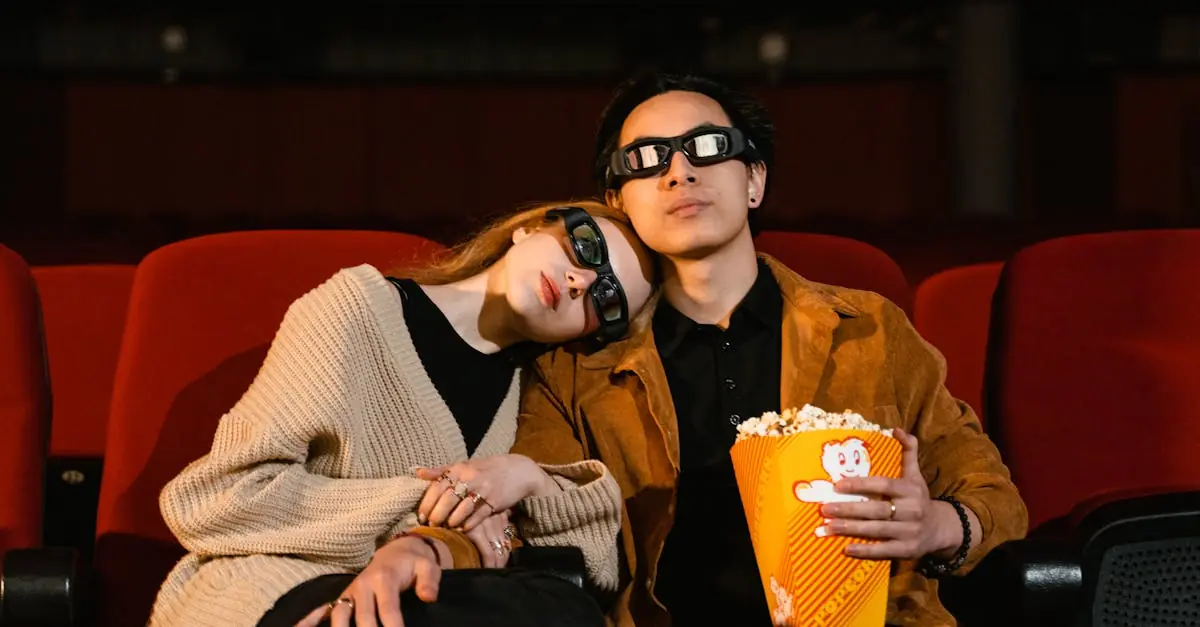Table of Contents
ToggleMovie soundtracks have a magical way of transforming a good film into an unforgettable experience. They set the mood, evoke emotions, and sometimes even steal the show. Think about it: when was the last time you found yourself humming the tune from your favorite flick? Those catchy melodies and powerful ballads linger long after the credits roll, making them just as iconic as the movies themselves.
From epic orchestral scores to chart-topping hits, movie soundtracks have a knack for turning ordinary moments into cinematic gold. Whether it’s a heart-pounding action scene or a tear-jerking romance, the right song can elevate the story and leave audiences craving more. So grab your popcorn and get ready to dive into the world of movie soundtrack hits that have left a lasting impression on both film lovers and music enthusiasts alike.
Overview of Movie Soundtrack Hits
Movie soundtrack hits play a crucial role in defining cinematic experiences. They evoke emotions and enhance storytelling, making scenes more impactful. Iconic soundtracks often feature a mix of orchestral compositions and contemporary songs, blending different musical styles to cater to diverse audiences.
Numerous films have achieved popularity largely due to their memorable soundtracks. While “The Bodyguard” (1992) features Whitney Houston’s “I Will Always Love You,” “Titanic” (1997) showcases Celine Dion’s “My Heart Will Go On.” These tracks not only topped charts but also became synonymous with their respective films.
Chart-topping hits from movie soundtracks often gain recognition beyond the film itself. For example, “Lose Yourself” by Eminem from “8 Mile” (2002) won an Academy Award for Best Original Song, highlighting its cultural significance. This reinforcement of music and film creates lasting connections for audiences.
Musicians frequently collaborate with filmmakers to create unforgettable tracks. Composers such as Hans Zimmer and John Williams have produced numerous legendary scores, while artists like Pharrell Williams and Adele have contributed contemporary hits. Such partnerships elevate the overall emotional impact of films.
The interplay between movie scenes and soundtracks can transform narratives, enhancing character development and plot progression. Depending on genre, whether it be drama, action, or romance, soundtracks serve to amplify tension or evoke sentiment. These dual effects captivate viewers, making soundtracks an essential aspect of film production.
Through analyzing various movie soundtrack hits, one can appreciate the artistry involved. These musical compositions and songs become pivotal elements, often remembered long after the credits roll. Engaging with these soundtracks allows fans to relive film moments and draws them deeper into cinematic storytelling.
Historical Significance of Soundtracks
Soundtracks hold vital importance in cinema, influencing both viewers and narrative. Their evolution reflects changes in technology and cultural trends.
Early Film Scores
Silent films relied heavily on live orchestras. These performances set the mood and conveyed emotions without dialogue. Piano scores often accompanied film screenings, creating immersive experiences. The first synchronized score,”The Jazz Singer,” released in 1927, marked a turning point, blending music with dialogue for the first time. This landmark film highlighted the potential of soundtracks in storytelling, shaping future cinematic compositions.
Evolution Through Decades
The 1930s through the 1950s saw orchestral music dominate soundtracks. Composers like Max Steiner and Dmitri Tiomkin crafted memorable themes that became iconic. The 1960s introduced rock and pop influences, as films like “Easy Rider” and “The Graduate” featured contemporary hits. By the 1980s, soundtracks integrated various genres, connecting audiences to their beloved films. Modern soundtracks now often feature collaborations between musicians and filmmakers, blending styles and appealing to diverse tastes. This ongoing evolution showcases soundtracks’ role in enhancing the cinematic experience, enriching film narratives across genres.
Iconic Movie Soundtrack Hits
Movie soundtracks leave a lasting impression, becoming synonymous with the films they accompany. Here are some unforgettable examples.
Classic Soundtracks That Defined Eras
Singing along to “My Heart Will Go On” from Titanic captures the essence of the ’90s romance. Another classic, “Stayin’ Alive” from Saturday Night Fever, embodies the vibrant disco era. The score from Star Wars, composed by John Williams, revolutionized film music with its powerful themes. The Graduate features Simon & Garfunkel’s iconic tracks, which reflect the counterculture of the ’60s. These soundtracks not only enhance the films but also mark significant cultural moments, connecting generations through music.
Contemporary Hits That Captivated Audiences
“Shallow” from A Star is Born resonated widely, showcasing the vocal talents of Lady Gaga and Bradley Cooper. Black Panther’s score, composed by Ludwig Göransson, fuses traditional African music with modern hip-hop, creating a unique listening experience. “Lose Yourself,” an award-winning track from 8 Mile, remains a motivational anthem for many. “Everything Is Awesome” from The Lego Movie became a playful hit that appealed to audiences of all ages. Soundtracks like these reflect current trends while evoking powerful emotions, reinforcing their place in modern cinema.
The Impact of Soundtracks on Movies
Soundtracks play a crucial role in shaping the emotional landscape of films. They resonate deeply with audiences, enhancing storytelling and evoking strong feelings.
Emotional Resonance in Storytelling
Music enhances emotional moments in films, making scenes unforgettable. Each note can amplify joy, sadness, or tension. For instance, in “Titanic,” Celine Dion’s “My Heart Will Go On” closely ties to the film’s themes of love and loss, evoking deep emotional responses. Throughout the cinematic experience, a well-placed song or score ignites feelings that draw viewers into the narrative. Both classical compositions and contemporary songs serve this purpose, often becoming integral to the overall message of the film. Soundtracks frequently create lasting memories, as they link specific songs with pivotal plot points.
Enhancing Viewer Experience
Soundtracks elevate the viewer experience in various ways. By incorporating popular songs into key moments, films connect with broader audiences. “Guardians of the Galaxy” showcases this strategy, using classic hits to create nostalgia and engage viewers. Similarly, scenes in “Black Panther” utilize traditional African music alongside modern sounds, enhancing cultural appreciation and connection. Powerful music underscores action sequences, heightening the thrill and momentum. Whether through orchestral scores or chart-topping hits, soundtracks enrich every layer of storytelling, leaving a lasting impact on the audience’s cinematic journey.
Notable Composers and Artists
Iconic composers and artists significantly shape movie soundtracks, contributing to unforgettable cinematic experiences. Their work often transcends film, becoming cultural touchstones.
Legends of Film Music
Renowned composers like John Williams and Hans Zimmer have created unforgettable scores. Williams’ themes for “Star Wars” and “Jurassic Park” showcase his distinctive style. Zimmer’s work on “Inception” blends orchestral elements with electronic music, enhancing emotional depth. Max Steiner, often deemed the pioneer of film scoring, introduced memorable motifs with “Gone with the Wind.” Ennio Morricone transformed westerns with his innovative sounds in “The Good, the Bad and the Ugly.” These legends laid the groundwork for future composers, solidifying their places in cinematic history.
Rising Stars in Soundtrack Composition
New talent is reshaping film music, bringing fresh perspectives to soundtracks. Ludwig Göransson’s score for “Black Panther” elegantly combines African musical elements with contemporary sound. Similarly, Hildur Guðnadóttir made waves with her haunting work on “Joker,” earning an Academy Award for Best Original Score. Other emerging artists, like Jonny Greenwood, are gaining recognition for innovative scores in films like “There Will Be Blood.” Their contributions reflect a shift toward more eclectic sounds, exciting audiences and filmmakers alike. As the film industry evolves, these rising stars continue to push creative boundaries.
Movie soundtracks are more than just background music; they’re integral to the film experience. By enhancing emotions and deepening narratives, soundtracks forge unforgettable connections between viewers and stories. Iconic tracks resonate long after the credits roll, becoming part of cultural memory.
The collaboration between filmmakers and musicians continues to evolve, offering fresh sounds that captivate audiences. As the landscape of cinema changes, so too does the role of music in storytelling. Whether through powerful orchestral scores or chart-topping hits, soundtracks will always enrich the cinematic journey, ensuring that every film leaves a lasting impression.





